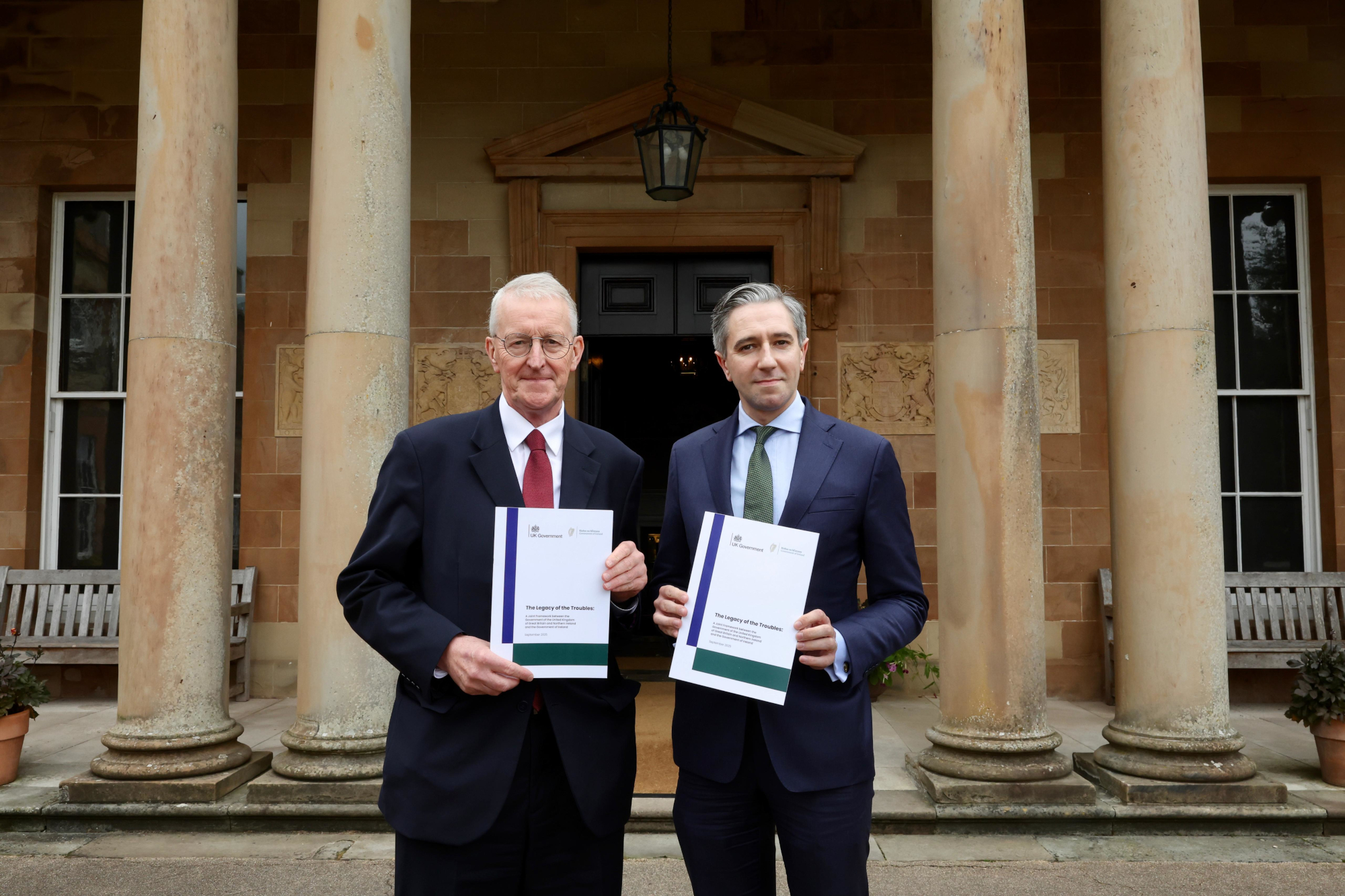UK and Ireland announce joint approach to legacy of the Troubles

Pictured (left–right): The UK's Northern Ireland secretary, Hilary Benn, and Ireland's Tánaiste and foreign affairs minister, Simon Harris.
The UK and Irish governments on Friday published a joint framework for dealing with the legacy of the Troubles, hailed by Simon Harris as “a return to a partnership approach on Northern Ireland”.
The seven-page document was launched at Hillsborough Castle by the UK’s Northern Ireland secretary, Hilary Benn, and Mr Harris as Ireland’s Tánaiste and foreign affairs minister.
It includes a commitment from the UK government to repeal and replace the previous administration’s deeply controversial Northern Ireland Troubles (Legacy and Reconciliation) Act 2023.
The legislation led Ireland to lodge a rare interstate case against the UK at the European Court of Human Rights in January 2024. The Irish government says it will withdraw the case once the legislation is repealed.
Under the new agreed framework, the widely-criticised Independent Commission for Reconciliation and Information Recovery (ICRIR) established by the 2023 Act will be formed into a new body called the Legacy Commission.
Legacy inquests which were halted by the 2023 Act will be allowed to resume, while other previously directed inquests will go ahead subject to an independent assessment by the UK’s solicitor general.
However, no new inquests will be announced, with the reformed Legacy Commission becoming the “primary route” for legacy investigations to take place.
The Legacy Commission’s investigations will be capable of leading to prosecution, though there are “six new rights, safeguards and protections” for former British soldiers.
The prohibition on civil cases relating to the Troubles will also be lifted.
Speaking on Friday, Mr Harris said: “The 2023 UK Legacy Act was unilaterally conceived, unilaterally drafted, and unilaterally implemented. Today is a step-change from that.”
He said the new joint framework “provides routes to truth and accountability for those most affected by the violence of the Troubles”.
“The Irish government made clear from the outset that any agreed joint approach to legacy by the two governments would need to meet two tests — compliance with the European Convention on Human Rights, and capable of securing the support of those most affected, especially the families of those killed.
“I believe that this framework, faithfully implemented, can deliver on those two goals.
“I am fully aware that winning the confidence of families will take time. Since the beginning of the year, I have listened to victims’ families and those working to support and represent them. For them, delivery is the real, and only, test.
“I believe that what we have agreed can deliver for families.”
As part of the joint framework, the Irish government has also made commitments, including the creation of a new dedicated legacy unit within An Garda Síochána.
Ireland will also ring-fence €25 million to support the participation and representation of victims and families in legacy processes.
“Reciprocity is at the heart of this framework: the Irish government will cooperate with the reformed Legacy Commission and we will receive similar cooperation from the British government on troubles-related inquiries, inquests and investigations in this jurisdiction,” Mr Harris said.
Mr Benn said: “The previous [UK] government’s flawed, undeliverable and widely opposed Legacy Act has caused great pain and anguish to many people in Northern Ireland.
“I believe that this framework, underpinned by new co-operation from both our governments, represents the best way forward to finally make progress on the unfinished business of the Good Friday Agreement.
“And I hope that having read what we are proposing, the communities who were most affected by the Troubles will see this as a way forward in which they can have confidence, and will therefore give this plan a fair chance.”








